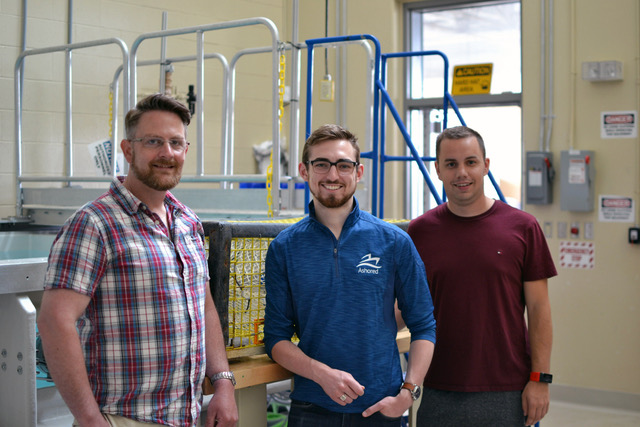After fielding 3,000 applications, MassChallenge this month accepted 100 startups into its international accelerator for 2019, and it included only one Canadian company – Ashored Innovations of Dartmouth.
In an interview after the announcement, Ashored CEO Aaron Stevenson said he was thrilled to be accepted into the Boston-based program and spoke about the doors it will open for the company. But he was more eager to discuss another aspect of his company’s experience – the opportunity to join the global discussion on protecting marine environments.
Ashored is developing commercial fishing equipment that aims to avoid harm to sea life and the marine environment. Stevenson said the company is still “firmly in research and development mode”, but as it develops the product Stevenson and his five colleagues have been involved in events around the world discussing how to better protect our oceans.
“In so much of the commercial fishery, there’s a gap between where they are today and . . . and where the public would like to see the wild fishery,” said Stevenson. “The whole idea of sustainably caught wild fish . . . that’s where people want to go. It’s clear that the old ways of doing things are not going to be tolerated for much longer.”
Ashored strives to be part of that movement. Working with various organizations, the company has participated in a virtual accelerator in San Diego, engaged with the French embassy in Ottawa, and will attend the 7 Seas Summit in Lisbon next month.
LeeWay Marine Plans Expansion with ACOA Loan, Scale-Up Hub
Now two years old, Ashored is developing equipment that reduces the risk of animals such as whales becoming entangled in ropes, and the risk of lost equipment littering the ocean floor. Its first product, the Modular Ocean Based Instrument, or MOBI, is a lobster trap buoy that is positioned near the ocean floor . When the fishing boat returns to collect the trap, the spool of rope on the buoy unwinds so the buoy can float to the surface and the fishermen can collect the trap.
The intelligent buoy also captures such data as location, date, weather, tides, and water temperature, to help improve the catch over the long term.
Ashored is also developing a product called Atlas, which uses radio frequency ID and sonar to locate equipment on the ocean floor and make sure all equipment is retrieved.
Stevenson, who took the company through the Masters of Technology, Entrepreneurship and Innovation program at St. Mary’s University, said the team conducted its first sea trials of MOBI last fall. That product had a timer for unraveling the spool and it established the basic functionality of the product in the open ocean. Working with the Halifax engineering company Enginuity, Ashored will this autumn test an improved product in which the spool unwinds on command via a radio signal as the fishing boat approaches.
If all goes according to plan, Ashored could begin preliminary sales in 2020 and fully enter the market in 2021. The company, which operates out of the COVE Startup Yard in Dartmouth, has never raised equity capital and has grown with $340,000 in funding from competitions or grants.
Stevenson said he hopes the MassChallenge experience will lead to investment from backers outside the region. And also, he hopes it will provide an opportunity to deepen Ashored’s involvement in the movement to protect the marine environment.
“How we’ve positioned our company is, from what we’ve seen so far, quite unique on the international stage,” said Stevenson. “We’re looking toward to the future and seeing where sustainability is going and what needs to happen to get there. I think we have a compelling and unique story that captures people‘s attention. “










